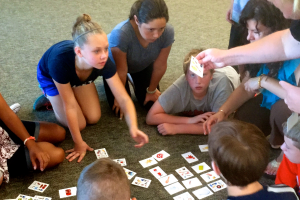Building Community with Ubuntu Cards - I am because you are.

Cards as Conversation Starters
Card tricks have always been a good icebreaker for any group. High 5’s innovator, Ryan McCormick, had something different in mind when he created Ubuntu cards. The word Ubuntu, which has its roots in African humanist philosophy, sees the idea of community as a key element in human culture. A translation of the word is I am because you are, though the word is more generally seen as part of the Zulu phrase umuntu ngumuntu ngabantu, which translates a person is a person through other people. Those words and that philosophy are at the core of High 5’s mission of helping individuals discover their best selves, a discovery made through our relationships with others.
Ryan’s intention, which was counterintuitive in a world where everyone strives to demonstrate their uniqueness, was to create an educational activity to discover commonalities at the most basic levels, levels accessible in a gathering of strangers. Even with the simplest of images, that discovery process requires us to spend time and energy, talk and connect with others, and reflect on those connections.
In the hands of experiential educators, Ubuntu cards become a tool…
- For making friends with strangers,
- For discovering common interests and shared humanity,
- For laughing over how small the world can be, and
- For creating a community where there was none.
If you look in a High 5 educator’s toolkit, you will always find a pack of Ubuntu cards. How they are employed in shaping a bunch of individuals into a group varies with the educator and the group, their ages and any common objective, but the principle is always the same: understanding what we share—what brings us together, not what keeps us apart.
Below, three of our most experienced trainers, share their favorite Ubuntu card activities that break the ice and help your students, teams, co-workers, and participants have fun and connect in new ways. The cards are a great tool for limitless reflection and creative play. There aren’t any hard and fast rules with these cards that automatically come with 13 built-in activities. Here are three activities that our trainers especially enjoy playing.
3 Favorite Ubuntu Card Icebreaker Activities
Phil Brown—TPOT
Oddly enough, although coffee is his preference, Phil Brown has given his favorite Ubuntu activity a nickname: TPOT, an acronym for That-Person-Over-There. TPOT flips the tables on standard introductions – the activity invites you to introduce someone other than yourself. By using an image on an Ubuntu card that has a personal relevance, such as the whisk if you happen to be drawn to the culinary arts, the sharing begins. The discovered relevance can be literal or metaphorical, or historical, based on personal experience. Boiling it down, TPOT is an exercise in:
- taking social responsibility,
- sharing some aspect of ourselves by way of introduction,
- learning about others,
- and using that shared insight in introducing the individual to the group.

Basically, it is about opening up to a stranger, enabling them to learn about us and, in turn, listening and learning about that person in order to be able to introduce them to others. This type of introduction requires a bit more active listening and attention. Now, that’s an icebreaker!
Rich Keegan—Find and Flee
Find and Flee is an activity for groups of five that allows members to identify something they have in common, in this case a symbol on an Ubuntu card, then, once having discovered that symbol, leave their original group and join another in search of someone else with the same symbol. It is a wonderful icebreaker for introverts, as it allows participants to focus their attention on the card and the symbol they hope to match, rather than the more traditional method of meeting new people, which calls for looking strangers in the eye. That novel and non-traditional approach to meeting helps embolden the faint of heart, opening them to connection and a shared experience with someone new. Find and Flee is an activity that works well with small groups and can be effective with groups of fifty or more.

Ryan McCormick—Secret Object
Ubuntu cards are highly versatile and very portable team development tools—Ryan describes them as the Swiss Army Knife of educational materials. They’re capable of supporting a wide range of activities, utilizing images printed on the cards to provide reference points for conversation-based problem solving. They allow strangers in a group to discover commonalities, facilitating and encouraging personal connections that can lead to shared understanding, mutual respect, and successful collaborative problem solving.

How to Play Secret Object
Secret object is an inquiry-based discovery and team-building activity that works along the lines of ’20 questions.’ A symbol is chosen by one participant, who cannot say what it is, and the rest must discover its identity by asking questions. Is the symbol alive? Can it move? Can I hold it in my hand?
The search for understanding requires us to ask questions and reflect on the answers. But how do we ask those questions? Such as…
- What do we mean when we ask a question?
- Are we seeking an understanding that is literal or figurative?
- Do our questions combine with those of others in bringing us to a simultaneous shared understanding? Or are we in a hurry to guess?
- Are we members of a team, or trying to be heroes, to be first, to show how smart we are, to be unique?
On reflection and in discussion, the 20-question format is a more conservative approach, one that seeks and shares input, and allows more people to participate in solving a problem. Do we succeed as members of a team—all for one and one for all—or as individuals with no real regard for others?
Ubuntu cards help to break the ice. The relationships and connections that form in the wake of all this icebreaking is knowing more than a person’s name. It’s getting to know someone on a deeper level, finding similarities and differences, and having fun while doing so. Ubuntu cards reveal in both subtle and straightforward ways, there exists a common bond between us all.
Additional Resources
- Read a Blog about the origins and creation of Ubuntu cards
- Need a deck? Find them in our Store.
- Join Ubuntu Cards Group on Facebook – the place where Ubuntu card ideas are shared.